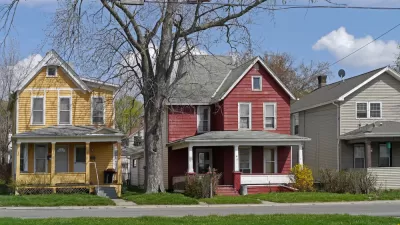A second Pew Center report on transportation and climate change has been released. It places most emphasis on vehicle technology and fuel, less on transit and smart growth. However, urban planners should note that pricing policies are stressed.
Urban planners will have difficulty in simply finding where smart growth solutions are discussed. After a brief mention in the report's executive summary, planners should go to Section 2.5.7 Moving Towards Compact Development to read why smart growth was discounted.
"Today's technologies, if widely used, can already make substantial gains in fuel efficiency and emission cuts, while a fuel mix of electricity, biofuels, and hydrogen could significantly reduce gasoline-powered vehicles by mid-century, the report states".
From executive summary, pg. XI of report: Moving Towards Compact Development: "A recent National Research Council study and two other recent studies conclude that GHG emissions could be reduced by 10 percent or more by 2050 if 75 to 90 percent of all new development were "compact." Because of competing priorities at the local level, however, the scenarios in this study achieve reductions in travel and GHG emissions of 0.5 to 2.0 percent by 2035 and 1.5 percent to 5.0 percent by 2050."
"This report is an update of Pew Center's 2003 report on Reducing Greenhouse Gas Emissions From U.S. Transportation
Thanks to Len Conley
FULL STORY: Press Release: NEW REPORT EXAMINES PATHS TO CLEANER, MORE SECURE US TRANSPORTATION SOLUTIONS

Maui's Vacation Rental Debate Turns Ugly
Verbal attacks, misinformation campaigns and fistfights plague a high-stakes debate to convert thousands of vacation rentals into long-term housing.

Planetizen Federal Action Tracker
A weekly monitor of how Trump’s orders and actions are impacting planners and planning in America.

In Urban Planning, AI Prompting Could be the New Design Thinking
Creativity has long been key to great urban design. What if we see AI as our new creative partner?

King County Supportive Housing Program Offers Hope for Unhoused Residents
The county is taking a ‘Housing First’ approach that prioritizes getting people into housing, then offering wraparound supportive services.

Researchers Use AI to Get Clearer Picture of US Housing
Analysts are using artificial intelligence to supercharge their research by allowing them to comb through data faster. Though these AI tools can be error prone, they save time and housing researchers are optimistic about the future.

Making Shared Micromobility More Inclusive
Cities and shared mobility system operators can do more to include people with disabilities in planning and operations, per a new report.
Urban Design for Planners 1: Software Tools
This six-course series explores essential urban design concepts using open source software and equips planners with the tools they need to participate fully in the urban design process.
Planning for Universal Design
Learn the tools for implementing Universal Design in planning regulations.
planning NEXT
Appalachian Highlands Housing Partners
Mpact (founded as Rail~Volution)
City of Camden Redevelopment Agency
City of Astoria
City of Portland
City of Laramie



























